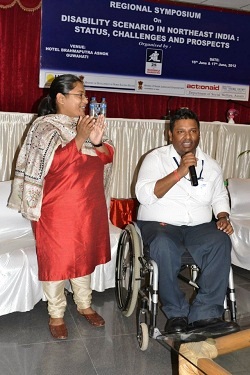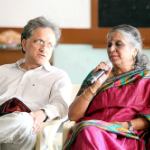Bangladesh is most vulnerable country due to adverse impacts of Climate Change (CC) is well recognized by the international scientific and negotiating communities. Several studies revealed that the key vulnerability contexts of Bangladesh to CC are -- sea level rise and salinity intrusion, increase of drought, erratic behaviour of rainfall and temperature, changes of nature of cyclone and storm surges and frequency and intensity of flood.
And eventually the low lying coastal belt is the most vulnerable geographical part of the country. “Around six to seven crore people of the country would be homeless due to the sea level rise…apart from food security, there will be massive outbound migration" said Prof Ainun Nishat, a senior adviser to International Union for Conservation of Nature and Natural Resources. Forestation has to be introduced to combat carbon dioxide, he said, adding that the world's temperature has increased by 0.76 degree Celsius since 1850, whereas the rise in Bangladesh is 1.1 degrees Celsius. Foreign Minister of the country Dipu Moni predicts that rising sea level “could swallow one-third of [Bangladesh's] low-lying country.”
The climate can be described as the average weather over a period of time. Climate Change (CC) means a significant change in the measures of climate, such as temperature, rainfall, or wind, lasting for an extended period – decades or longer. The most general definition of CC is a change in the statistical properties of the climate system when considered over long periods of time, regardless of cause. Accordingly, fluctuations over periods shorter than a few decades, such as El Niño, do not represent CC. The Earth's climate has changed many times during the planet's history, with events ranging from ice ages to long periods of warmth. What’s different about this period of the earth’s history is that human activities are significantly contributing to natural CC through our emissions of greenhouse gases. This interference is resulting in increased air and ocean temperatures, drought, melting ice and snow, rising sea levels, increased rainfall, flooding and other influences.
Young people all over the world are today standing up and calling for proper attention to CC. They are both angry with scenarios that in some cases seem inevitable and confident that their contributions will make a difference. CC is one of the most critical concerns of this generation of Bangladesh where the youth of the region will face enormous challenges in the future. Raising awareness among youth and engaging them in action on the ground will be an important factor in addressing CC all over the world.
Bangladesh Youth Movement for Climate (BYMC) was initiated to mobilize the Bangladeshi Youth and Build the national youth alliances to take actions on CC. Another aim is to engage Bangladeshi youths with the International Youth Climate Movement to empower them globally and take their voices into decision making platforms as youth are deserted in decision making process.
“We understand that climate change cannot be solved overnight or even over a few years; it will take a sustained effort and immense dedication to the cause for addressing it and nurturing such dedication in the new generation is vital. It becomes a necessity to build a network among the youth of South Asian region for achieving social rights. If we can build a strong and active network, together we can put pressure on world leaders to gain our rights. This workshop is one such initiative in building a network”, said a youth of Bangladesh Youth Movement for Climate (BYMC), a voluntary and youth lead initiative for climate change at the time of arranging a workshop titled ‘Training for Trainers’ (T4T) on Climate Change for 25 bright youth activists from South Asian region.
International Youth Council (IYC) Bangladesh, chaired by Joynul Abedin, is another organization to work on the issue of CC among the youth, including their focus on the issue of environment.
But the initiation of youth engagement in the issue of CC at the national level by the government is relatively very new one. The First National Conference of Youth Think Tank on Climate Change and Health (YTTCCH) organized by Climate Change and Health Promotion Unit (CCHPU) of Ministry of Health & Family Welfare was held at the Bangladesh Forest Department in Agargaon, Dhaka from May 24-25, 2012. The objective of the conference was to train the Youth Think Tank (YTT) members in solving climate and health problems of their communities using their innovative ideas, creativity, expertise and local resources. The two day long national youth conference ended on a high note with the expectation that the YTTCCH members will be an added strength to Climate Change and Health Promotion Unit (CCHPU) who will work to build capacity and strengthen health systems to combat the health impact of Climate Change. They will be the future leaders in protection of human health from current and projected risks due to climate change.
The country lacks enough youth engagement and participation in the issue of CC voluntary basis, to make the people of the country aware. But there are many young professional, in government and nongovernmental organizations, are working on different issues related to CC: e.g. climate resilience, climate vulnerability, gender and CC, conservation of natural resources, conserving the biodiversity, disaster preparedness, disaster management, disaster risk reduction etc. Along with these, there are lots of studies, both academic and non academic, on the issue of CC all over the country where thousands of youths are engaged, both as a researcher and as respondents.
Young people are a wellspring of ideas for innovation. They are today's thinkers, problem-solvers and catalysts for peace. They are often the world's strongest advocates of justice and dignity. Partnerships with youth can increase opportunities for success by leveraging comparative advantages, resources, shared interests and diversity to enhance the impact of each individual partner's efforts. Through working proactively to forge meaningful partnerships with young people and youth organizations, we can ensure that we lay the foundation for building a better world.
The aim of youth engagement in CC issue is to raise awareness among young people, and help them understand CC and take appropriate actions in their local communities and in broader level as much as they can. Without them, we cannot thing of a world with sound climatic condition. "TO unleash the power of young people, we need to partner with them," said United Nations Secretary-General Ban Ki-moon. Our eyes are set on the horizon to see a strong enough Bangladesh to tackle effects of CC.
The world's population is young, with nearly 2.2 billion people under the age of 18, of which 85 percent are living in developing countries. Young people are concerned, thoughtful citizens, capable of participating in, and changing the society of which they are a part; and they have an important role to play in addressing and affecting the issues of our world.
In addition, young people have enthusiasm, imagination and abundant energy to undertake local actions, act as effective communicators in their communities and be involved in international arenas.
Youth can contribute in the issue of CC by i) delivering CC education and outreach opportunities for youth; ii) promoting leadership development for youth to take action on CC issues; iii) encouraging realistic feedback to government in order to effect positive change relevant to youth; and by many other means and strategies.
A number of agencies have developed youth-related initiatives linked to their mandates and areas of work. The United Nations Educational, Scientific and Cultural Organization (UNESCO) had been assisting in environmental CC educational policy. The Food and Agricultural Organization (FAO) has been supporting the development of food security and CC educational programmes and resources for rural farmer field and life schools. UNICEF has a Youth Climate Change Ambassador Programme and has developed the “Unite for Climate” online community for youth CC action.
About 1,500 young people participated in the COP 15, where they organized side events, a youth arcade, a Young and Future Generations Day, submitted technical documents, analysed policy developments, staged creative awareness-raising events, and actively participated in the negotiation process. Youth participation has brought moral and equity-based values as well as constructive technical and policy inputs to the negotiations.
Find us on facebook: facebook.com/TheThumbPrintMag







































